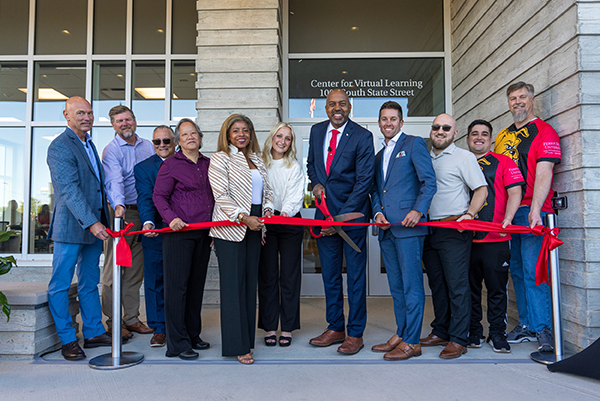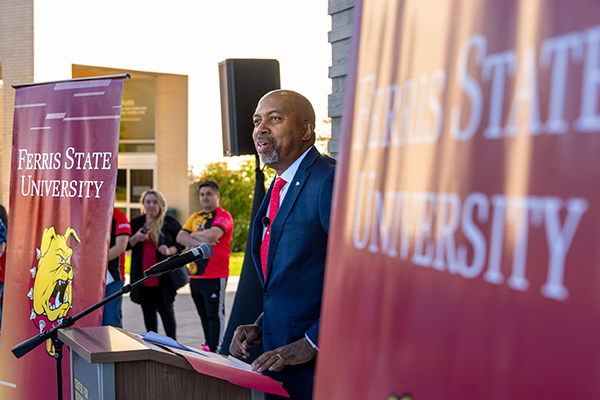
A ceremonial ribbon was cut at Ferris State University on Thursday morning, Aug. 31,
as the university officially dedicated the new $32 million Center for Virtual Learning
on the Big Rapids campus.
Ferris State University on Thursday dedicated its Center for Virtual Learning, a $32 million facility intended to prepare students for careers in fields that are rapidly evolving – and might not even exist yet.
This new facility is located on the Big Rapids campus but will help Ferris State connect with students around the state and around the world. It is intended to be the physical hub of the Ferris State learning metaverse, bringing students, educators, and technology together, virtually and physically, as a community pursuing innovation and excellence in their fields of study.

Ferris State President Bill Pink addressed the crowd as the university officially
celebrated the opening of the new $32 million Center for Virtual Learning on the Big
Rapids campus on Thursday, Aug. 31.
“The potential this building has for programming is amazing,” Ferris State President Bill Pink said before joining students, educators and partners in cutting the ceremonial ribbon. “It has the kind of technology that is not only relevant for today but is malleable for skills for tomorrow.”
The building, constructed with state and university resources, houses programs aimed at tapping state-of-the-art technology, and teaching others how to adapt rapidly evolving tech skills to their current work.
Programs include:
Information Security and Intelligence. Ferris State’s program is a national leader, accredited by the National Security Agency, U.S. Department of Defense and the Accreditation Board for Engineering and Technology. The program has increased space for Artificial Intelligence and Project Management degrees.
- Esports Arena. This is the first arena built purposely for esports, which is a rapidly growing area. Students will be competing, but also be gaining in-demand skills for the rapidly expanding field of game design.
- School of Education - eLearning: The new facility will help Ferris State teach the next generations of educators to more effectively teach online. This is key as Ferris State creates Student Success Hubs to reach out to learners across the state.
- School of Digital Media: New facilities and technology that prepare students for ways to convey information and stories in new and evolving ways, connecting with wider audiences.
Bobby Fleischman, Ferris State’s provost and vice president for Academic Affairs, said the programs within the Center for Virtual Learning are consistent with the university’s focusing on making a quality education accessible.
“At Ferris State, we are proud of our history and our mission -- with good reason,” he said. “We are inspired to do better and think more boldly every day. Years from now, when future generations look back, I’m convinced they will look at this day and this facility as a key moment in our university’s history.”
The building’s special features include a Faraday Room, a super-secure room allowing for forensic analysis and artificial intelligence work. Students will work on cyber security and ways to spot and thwart malware, making our computers and world safer.
The Esports Arena is the first arena built purposely for esports. Students will be competing, but also be gaining in-demand skills to design games.
Esports, short for electronic sports, is a form of competition using video games, with participants squaring off as individuals or teams. More than 240 colleges and universities are fielding esports teams with more than 5,000 student-athletes, according to the National Association of Collegiate Esports, a Kansas City based nonprofit.
The area includes special esports chairs, obtained through a partnership with Herman Miller. Jon Campbell, vice president of Herman Miller and vice president and general manager of HMG, Global Retail, said he was proud to partner with Ferris State and study how the chairs are used.
He said the company will use its history of furniture design to look at how to improve performance.
“How do we use this expertise in ergonomics and human-centered design to really make gamers more comfortable and prevent injuries as they play,” Campbell said. “You guys are creating opportunities for future gamers.”

